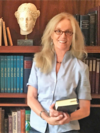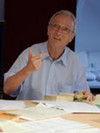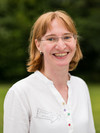Biblical Archaeology - Archaeology of the Biblical Lands
Biblical Archaeology – Archaeology of the Lands of the Bible
In this major field within the Bachelor program of Jewish Theology, archaeological findings of materials and structures are examined in the cultural contexts of the various lands of the Southern Levant. The time frame covered encompasses the principal historical periods relating to the Biblical narratives, that being the 1st millennium BCE, starting in the Iron Age during the reign of the Kings of Juda and Kings of Israel but also including the culture of the Late Bronze Age and its influences.
In the field of Biblical Archaeology, archaeological artefacts and the remnants of architectural structures are described and studied in their historical contexts, classified and, if possible, brought in relation to literary sources. The most comprehensive written source for this analysis which has been preserved to this day is the Bible itself, yet it is by far not the only source: cuneiform texts written on tiles during the Assyrian and Babylonian Empires are also important sources, along with documents from neighboring countries such as Egypt, inscriptions in stone or clay and the rabbinic commentary writings from later centuries, all of which shed light on the political and social contexts of these periods and can, from their own very different perspectives, confirm what the Bible text tells us or contradict the passages.
The interpretation of an archaeological finding is often questionable due to a number of possible factors: its poor or incomplete state of preservation, the lack of proper documentation at the time of its discovery, or its unknown provenance. Sometimes even the possibility of forgery must be considered. These same factors create challenges in interpreting ancient texts and artefacts, thus requiring a considered, scientific examination with the appropriate methodological approach.
In archaeology, the scientific approach takes account of the particularities of the settlement sites and various categories of material, each according to its own criteria. For instance, to determine chronological sequences, architectural structures need to be considered in terms of the strata in which they are found. Other materials include pottery as an excellent tool to determine age, as well as objects made from iron, stone, glass and, starting from the Persian period onwards, coins having clear chronological sequences. For the understanding of the written sources, several aspects are illustrative such as the type of composition and time and place of origin, matters which are discussed critically.
By definition, Biblical Archaeology involves research along the interface between two separate academic disciplines – Archaeology and Biblical Studies - and seeks to expand the understanding of historical developments and the knowledge of cultural-historical contexts.
The study program trains students in the basic methods of archaeological research and excavation, especially as required in the geographical regions of Israel and Jordan. It provides skills for the planning of an excavation, the description and documentation of archaeological data. As a part of the program, students will apply this knowledge by gaining practical work experience in the field as a volunteer on a digging site.
B. Schwarz
Bettina Schwarz, M.A. DHL
Campus Am Neuen Palais / Haus 2, Raum 2.10
Schwarz Bibliothek / Oranienburger Str. 32, 10117 Berlin
E-Mail: schwarz21uuni-potsdampde
Office hours: During the University's limited on-site operations mode consultations need to take place online, via Zoom. Please write an e-mail to arrange an appointment.
Prof. Dr. Rüdiger Liwak
Inhaber der Benno-Jacob-Professur
Campus Am Neuen Palais / Haus 14
E-Mail: ruediger.liwak@t-online.de
Tel.: (+49)331/977-4325 oder (+49)30/80-28-715
Academic assistant
Study afternoon at the Archaeological Centre
Announcement: Research and teaching excavation on Mount Zion in Jerusalem
19.-30.07.2021
Dr. Katja Soennecken | E-Mail: soennecken@uni-potsdam.de
As part of the Biblical Archaeology program, participation in the excavation of the German Protestant Institute for Archaeology (DEI) in Jerusalem is possible
Since 2015, the DEI has been researching the urban history of Jerusalem on Mount Zion, in the southwest of today's Old City. This was part of the walled city area of Jerusalem several times in the course of history. Its archaeological-historical significance is not so much due to the Jewish, Christian and Muslim places of remembrance located there today. Rather, it is its significance for the urban history of Jerusalem during the Iron Age IIB/C era and the period from the Hellenistic (i.e. Hasmonean) to the Byzantine era.
In 2021, the area will be expanded and excavated in the gardens of the nearby Dormitio Abbey. This is associated with the floor plan of one of the most important churches in Byzantine Jerusalem. The campaign will focus on the exploration of Roman and Byzantine buildings in its surroundings.
In addition to the archaeological field work, preparation of finds and documentation, there will be excursions twice a week to significant other excavations in Jerusalem as well as a scientific lecture.
At the beginning of the semester, there will be a preliminary meeting for those interested (via Zoom), where the excavation will be presented in more detail and organisational aspects will be discussed.
A prerequisite for participation is the willingness and ability to do physical work - even in hot weather. Excavation experience or participation in an introductory seminar on excavation techniques is desirable.



